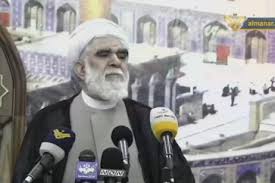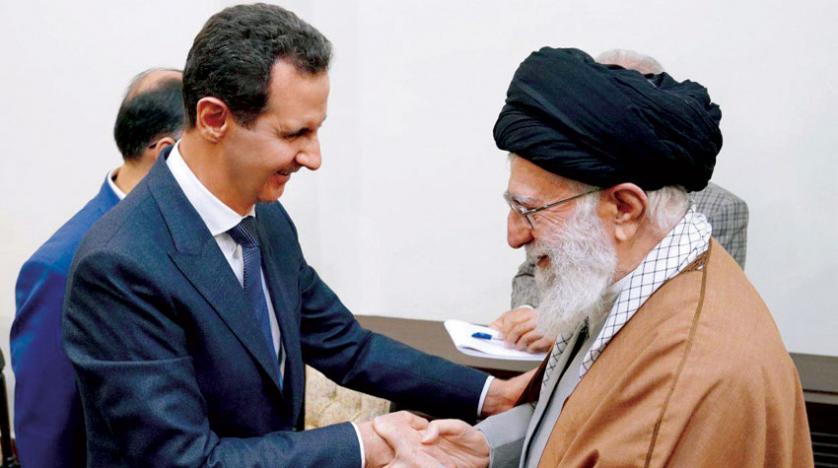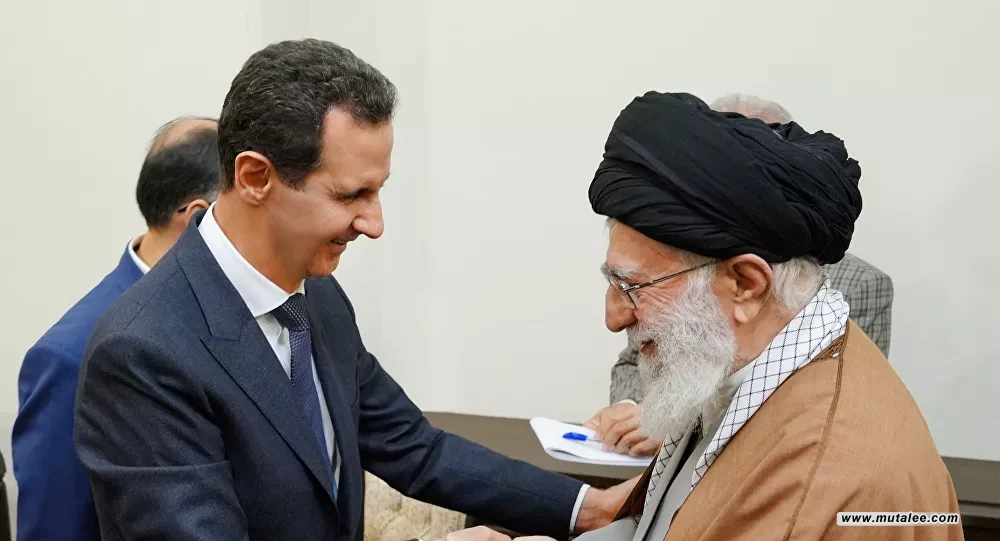In mid-February 1987, a delegation of Lebanese Islamic leaders arrived in Damascus and held a meeting with Syrian Vice President Abdel Halim Khaddam. During the meeting, they requested Syrian forces to intervene and restore security in Beirut, which was experiencing clashes and chaos. Khaddam subsequently presented the matter to President Hafez al-Assad, who made the decision to dispatch a military unit to enforce security in all areas of the Lebanese capital, including Hezbollah’s “Fathallah Barracks.”
In this particular episode of Khaddam’s memoirs, as published by Asharq Al-Awsat, the late Syrian Vice President recounts a dialogue that occurred in March 1987 between himself and the Iranian ambassador to Damascus, Hassan Akhtari. Akhtari had requested the meeting to mediate on behalf of Hezbollah. Khaddam expressed to Akhtari: “Officials in Iran should not equate (Hezbollah) with Syria. Iranian officials are aware of Syria’s stance towards Iran. We hope they understand the importance of Syria’s success in resolving the Lebanese crisis. I affirm that Syria has no intention of targeting (Hezbollah), but it cannot accept its refusal to comply with the security plan.”
Here is the text of the fourth episode:
In 1986 and early 1987, security collapsed in Beirut, with gangs and armed militias engaging in looting, robbery, theft, and murder. There were clashes between various factions, including the Amal movement, Al-Murabitoun, the Progressive Socialist Party, the Communist Party, and conflicts within Amal and the camps, as well as clashes involving the “Party of Allah” (Hezbollah).
In mid-February 1986, a delegation of Islamic leaders from Beirut arrived in Damascus, representing different sects. They presented the dire situation and requested Syria’s intervention to enforce security. I brought this matter to President Hafez Al-Assad, and after discussing it, he decided to send a military unit to Beirut in response to the request of the Islamic leaders. He instructed the army command to carry out the mission, and a “security plan” was developed for Beirut. The Syrian force entered the city to implement the plan, closing militia headquarters and confiscating weapons found there.
During the operation, the force also approached a Hezbollah barracks in Beirut known as the “Fathallah Barracks” and requested that party members evacuate the headquarters and surrender their weapons. After a discussion, the force faced heavy fire, resulting in the death of some soldiers. They responded with force, killing 22 people, and eventually seized control of the barracks.
On March 3, 1987, I met with the Iranian ambassador to Damascus, Hassan Akhtari, who requested the meeting to discuss certain matters. According to the recorded minutes of our meeting, the first topic was the events that occurred in Beirut, particularly in the “Fathallah Barracks,” and the ongoing developments in West Beirut
The minutes stated:
Regarding the first incident, which involved the killing of a group of men, women, and children, it had a severe impact on Iranian officials. The impression in Iran remains that this act was reckless and irresponsible. Iranian officials were shocked by the incident.
Subsequent events included the targeting of individuals with beards and the searching of women by men. The searches even extended to the car of the Iranian charge d’affaires in Beirut. They were physically removed from the vehicle and searched. These events occurred unexpectedly, as officials in Iran had initially welcomed the security plan, and there was no opposition to it in West Beirut.
Even during my interview with Mr. Farooq al-Shara (former Minister of Foreign Affairs), I discussed the cooperation from Hezbollah. After their meeting with you, they had promised to be committed. These events occurred despite their commitment, and they did not violate it.
Furthermore, the second point pertains to the southern suburb of Beirut and whether or not it is included in the plan. There have been statements and subsequent denials. Brigadier General Ghazi Kanaan, the Syrian intelligence officer in Lebanon, initially stated that Syrian forces would enter the southern suburb but later denied it. The officials in Tehran are interested in knowing the scope of the security plan and whether it encompasses the southern suburbs.
He added, “There is another point: the issue of confiscating weapons from Muslim homes in West Beirut. I recall my meeting with President Hafez Al-Assad when I presented my credentials. I discussed this topic, and he responded, ‘This topic is not on our agenda. We do not suggest taking their weapons, but rather, we will provide them with weapons to fight and resist.'” Akhtar continued, “Now, you are confiscating weapons from people’s homes. I am uncertain how this is happening. Should there be weapons in their homes, or should such weapons be confiscated? We, the officials in Iran, and our brothers in Hezbollah have exerted every effort to avoid justifications or arguments that could exacerbate the situation. Instead, we desire an atmosphere devoid of any such elements. Of course, Madam, I know what I want to convey. It is evident that our adversaries are greatly disturbed by the strong relations between our two countries, and they are seeking to disrupt these relations or create tension through various means. Newspapers publish articles and pictures as if there is a conflict between us, which they seek to magnify. Both you and we are aware of this. We fully acknowledge and appreciate the care and benevolence of the Syrian leadership and our brother, Hafez Al-Assad.”
He continued, stating, “Regarding Hezbollah, we genuinely desire the party to be an effective and formidable force in confronting Israel. We want it to be a strong supporter of Syria in its confrontation against Israel. Consequently, we are witnessing a malicious propaganda campaign aimed at undermining the relationship between Syria and Hezbollah. The enemies are employing propaganda to suggest contradictions between us. This is the enemy’s endeavor, and we aim to thwart it. Iranian officials, especially former President Ali Khamenei, Hashemi Rafsanjani, and Prime Minister Amir Hussein Mousavi, have described the West Beirut incident as irresponsible. They have emphasized that the Syrian leadership supports Hezbollah, recognizing that Hezbollah serves as the fighting arm against Israel.”
He continued, stating, “This propaganda aiming to separate Syria from Hezbollah is nothing but propaganda and a conspiracy for their own benefit. Syria is a strong supporter of Hezbollah. However, you are aware that Iranian officials face some popular pressure because the Iranian masses, driven by their love, affinity, and longing for the Syrian leadership, find it difficult to believe. They were taken aback by what occurred, and this situation has caused some concern among Iranian officials. In order to manage these sentiments, Iranian officials argue that the incident was an individual act, carried out by certain individuals. Through this approach, they attempt to control the public sentiment that was affected by this incident.”
He pointed out, “On the first night after I received the news of the incident in Fathallah, I attempted to contact Shara but was unable to reach him. After some time, the Minister of Foreign Affairs (Ali Velayati) called me. I contacted Beirut and urged them to exercise restraint, preventing any incident that could harm things we do not wish to harm, and to strive to avoid any problems. Any issue can be resolved through understanding, without deviating from the Syrian plan. We are ready to provide assistance. I addressed these matters in a general sense.”
He added, “These events stir up emotions among the people to the extent that it becomes challenging for us, you, and Hezbollah to control them. We hope that there will be no insult to people’s beliefs. For instance, during personal searches, individuals can be treated with kindness and brotherly behavior. Even if there is a need to search someone’s home, it can be done in a compassionate manner. In Iran, for instance, we conduct searches where men search men and women search women. As for the initial incident, the killing of young individuals, I believe it would have been possible to issue a statement or a signal that could have mitigated the impact of what transpired.”
After Akhtari concluded his speech, I responded by saying, “We have completely different information to share. First and foremost, I would like to express my gratitude to the Ambassador for presenting these facts. To provide further clarification, I want to emphasize two important points.”
“The first point is that Syria has always prioritized and nurtured the strong and brotherly relations with Iran, consistently working towards strengthening these ties. I reaffirm this commitment. Despite some irresponsible statements made in Tehran, which do not fully reflect our desire for robust relations, there has been a wave of statements from Iran acknowledging the brotherly relations between Syria and Iran. It is unfortunate that these statements tend to focus solely on a single incident in Lebanon.”
“We deeply regret the issuance of such statements, including those from Dr. (Ali) Velayati and the academic community, as well as part of the statement from (Mir Hussein) Mousavi, who claimed that ‘whoever extends his hand to Hezbollah serves Israel and America.’ Similar sentiments have been expressed by students and others. This is regrettable. The magnitude of the relationship between Syria and Iran, along with our joint struggle, should be viewed as far greater than any isolated incident occurring here or there. It is unfortunate that some individuals in Iran have attempted to create a division between Syria and Hezbollah. We believe that there is an anti-Syrian mobilization underway, but we hope that the Iranian leadership will handle it as they would any anti-Iranian mobilization in Syria.”
I continued, “If a citizen in Syria were to utter a single word against Iran, they would be imprisoned. If a group of people were to criticize Iran, we would deal with it strongly. This is how we understand the importance of maintaining relations between our two countries. The responsibility for Lebanese affairs rests with Syria, given Lebanon’s special relationship with us. We are one people. Furthermore, what happens in Lebanon directly impacts Syria’s security and regional policies. Our friends in the Islamic Republic of Iran should support this policy, as its fundamental principles align with their anti-imperialist and anti-Zionist stance.”
I continued by saying, “Nevertheless, despite these statements, Syria will remain steadfast in its commitment to its relationship with Iran, even though we are hurt by the reactions that should have been preceded by an explanation from Syria regarding the incident. If you would kindly clarify the facts that we have in our possession and if Iranian officials would review them, we could prevent our enemies from exploiting the incidents I mentioned. We have never questioned your actions in Afghanistan. We have refrained from making any comments because we understand the sensitivity of the matter between two neighboring countries. We reiterate that such statements will not affect our determination to uphold the brotherly relations between our two nations. However, we hope that these relations will not be clouded, and that we will not provide our enemies with opportunities to exploit them.”
She continued, “Secondly, when Hezbollah was established, we regarded it as a friendly party and provided it with assistance and support. Despite the negative actions carried out by some of its members against Syria’s friends in Lebanon and against Syrian soldiers, we did not react adversely. On the contrary, we acted based on our friendly relations with this organization and ensured that its role remained focused on confronting Israel. We do not hold a negative opinion of this party; in fact, we cooperate with them and provide them with our support. However, it is important to remember that we have been alerted multiple times about violations committed by certain members within this organization…”



